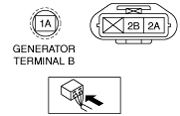 |
GENERATOR INSPECTION [MZR 1.6]
id0117s2800300
Charging System Warning Light
1. Verify that the battery is fully charged. (See BATTERY INSPECTION [MZR 1.6].)
2. Verify that the drive belt is correct. (See DRIVE BELT INSPECTION [MZR 1.6].)
3. Switch the ignition to ON, verify that the charging system warning light illuminates.
4. Verify that the charging system warning light goes out after the engine is started.
Generator
Generator voltage inspection
1. Verify that the battery is fully charged. (See BATTERY INSPECTION [MZR 1.6].)
2. Verify that the drive belt is correct. (See DRIVE BELT INSPECTION [MZR 1.6].)
3. Turn off all electrical loads.
4. Start the engine.
5. Verify that the generator rotates smoothly without any noise while the engine is running.
6. Measure the voltage at each terminal using a tester.
am6ccw00000082
|
Generator current inspection
1. Verify that the battery is fully charged. (See BATTERY INSPECTION [MZR 1.6].)
2. Verify that the drive belt is correct. (See DRIVE BELT INSPECTION [MZR 1.6].)
3. Disconnect the negative battery cable.
4. Connect a tester, which can read 120 A or more, between generator terminal B and the wiring harness.
5. Connect the negative battery cable. (See NEGATIVE BATTERY CABLE DISCONNECTION/CONNECTION [MZR 1.6].)
6. Turn off all electrical loads.
7. Start the engine.
8. Increase engine speed to 2,500 rpm.
9. Turn the electrical loads (headlights, blower motor, rear window defroster, brake lights, etc.) on and verify that the current reading increases more than the minimum value indicated below.
Generator Internal Parts
Rotor
1. Measure the resistance between the slip rings using a ohmmeter.
am6zzw00002350
|
2. Verify that there is no continuity between the slip ring and core using a ohmmeter.
am6zzw00002351
|
3. Inspect the slip ring surface condition.
Stator coil
1. Inspect for continuity between the stator coil leads using a ohmmeter.
am3zzw00007877
|
2. Verify that there is no continuity between the stator coil leads and core using a ohmmeter.
am3zzw00007878
|
Brush
1. Inspect brushes for wear.
am6zzw00002355
|
Brush spring
1. Measure the force of the brush spring using a spring pressure gauge.
2. Read the spring pressure gauge at the brush tip projection of 2 mm {0.008 in}.
am3zzw00007879
|
Rectifier
1. Inspect for continuity of the diodes using a ohmmeter.
am3zzw00007880
|
am3zzw00007881
|
Specification
|
Negative |
Positive |
Continuity |
|---|---|---|
|
E
|
P1, P2, P3, P4
|
Yes
|
|
B
|
No
|
|
|
P1, P2, P3, P4
|
E
|
No
|
|
B
|
Yes
|
Bearing
1. Inspect for abnormal noise, looseness, and sticking.
am6zzw00002358
|